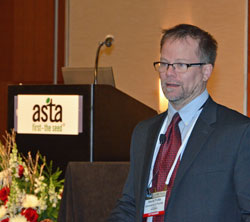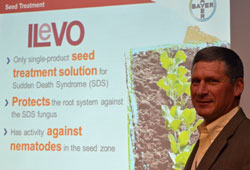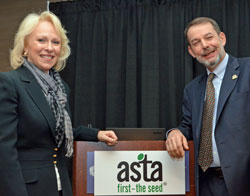 A new root-knot nematode-resistant variety and a full-season variety named after a legendary performer, both offering yield potential better than existing commercial lines, join the Deltapine® Class of 15 as the brand celebrates 100 years of breeding innovations.
A new root-knot nematode-resistant variety and a full-season variety named after a legendary performer, both offering yield potential better than existing commercial lines, join the Deltapine® Class of 15 as the brand celebrates 100 years of breeding innovations.
Monsanto also presented what is expected to be the next big innovation in cotton – the first triple-stacked herbicide trait technology to be in five Deltapine varieties, pending regulatory approvals. The announcements were made at the Deltapine New Product Evaluator (NPE) Summit in Nashville, Tenn., where some 140 farmers gathered for briefings on important topics related to cotton production.
The Deltapine NPE program has resulted in commercialization of many of the top-planted cotton varieties across the Belt. Only variety candidates that are proven by NPE farmers to have better yield, quality and performance than current commercial offerings will be commercialized.
“Since 1915, when the breeding program for Deltapine was initiated, the most important, production-improving innovations in cotton have come in Deltapine varieties,” said Keylon Gholston, Deltapine cotton products manager at Monsanto. “In 2015, Deltapine will celebrate its 100th anniversary as a leading cotton brand for farmers in the United States, one that has changed the face of U.S. cotton for the better. The Class of 15 represents how far we’ve come in terms of genetic advancements and fulfilling our commitment to the success of cotton farmers and the industry.”












